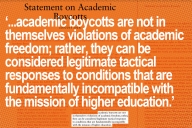You have /5 articles left.
Sign up for a free account or log in.
As movements to protest and silence controversial campus speakers have become common, the president of a new Harvard University student group intends to “saturate” the campus with those types of talks -- to challenge established ideologies that he said administrators there blatantly promote.
Open Campus Initiative was organized this year, its president, Harvard sophomore Conor Healy, said in an interview Friday.
Already, the group of roughly 25 students, Healy said, has secured commitments from two right-leaning, controversial figures to address the campus. One, writer Charles Murray, made headlines in March after his lecture at Middlebury College was drowned out by student chants, forcing him to stop. Murray is often accused of promoting racist ideals. Open Campus Initiative has not yet pegged a day for his talk.
The pick of Murray was deliberate, Healy said. He was horrified by the disruptions at Middlebury and said he wanted to prove Harvard could serve as a role model institution for free expression.
“Most of the community wants to hear from the people we’re inviting, they want to critique them, ask them hard questions, and they’re willing to be convinced,” Healy said. “If they’re not convinced, their perception of the truth can be reinforced by the opposing view.”
The other speaker, University of Toronto psychology professor Jordan Peterson, is due to lead a discussion this week. Late last month, Peterson also faced protesters -- equipped with cowbells and air horns -- at his speaking engagement at McMaster University in Ontario. Peterson has been criticized for his perspective on gender identity. He has rejected a Canadian policy that would have offered protections for gender nonconforming people and refuses to use gender-neutral descriptors, such as "they" as a singular pronoun, as a matter of policy.
Healy debated whether to invite ex-Breitbart News editor Milo Yiannopoulos, a deeply divisive media personality who resigned from the conservative website in February after a video emerged of him seemingly endorsing sexual relationships between men and underage boys. But Healy said Yiannopoulos has been known to occasionally heckle students from stage.
“That’s not really what we’re about,” Healy said.
Healy said the group also intends to ask liberal speakers to visit campus.
Inspiration for the group came after Healy enrolled in a freshman seminar course on free speech last year. A Canadian, Healy was struck by the integral part that freedom of expression played in America’s history and found himself mulling what he considered to be threats to open dialogue on Harvard’s campus.
Healy, who subscribes to libertarian philosophies, including a distaste for government interference in people’s personal lives, said some students try to curtail opposing viewpoints with “shut it down” mentality and behaviors.
Ousted pharmaceutical mogul Martin Shkreli came to Harvard in February, but his scheduled speech was halted when someone intentionally set off the fire alarm in the building. Protesters later interrupted Shkreli, who has been indicted on federal stock fraud charges, but he did continue with his talk.
Healy attended that event and said he was offended that other students would try to completely shut down Shkreli.
“That is so profoundly misguided in my opinion,” Healy said.
Dangers to First Amendment rights manifest in other ways, and the Harvard administration seems to endorse left-leaning values, Healy said.
He referenced a December 2015 controversy, in which Harvard distributed laminated place mats in the dining halls with tips on how to address hot-button issues with family members during the holidays. The Harvard Undergraduate Council wrote at the time that university officials shouldn’t prescribe “party-line” talking points for such concepts as Islamophobia.
“We do not think the offices of the university should be in the business of disseminating ‘approved’ positions on complex and divisive political issues,” the council wrote.
Administrators later apologized for the “Holiday Place Mat for Social Justice.”
Helene Lovett, a sophomore involved with lesbian, gay, bisexual, transgender and queer groups on campus, has organized a demonstration against the Peterson event. Outside, students will be "aggressively" handing out fliers and flags representing the transgender community.
Inside at the talk, Lovett hopes that students will hold up those flags when Peterson says something "problematic." This way they won't disrupt his narrative, but it will be a way to demonstrate silently, she said.
Lovett said she disagrees with Healy's interpretation that free speech is squashed on campus.
"I’m not willing to buy that students feel more threatened that they can’t speak than compared to the threats that marginalized communities feel every day," she said.
Rachael Dane, a university spokeswoman, said in an email that the university does not necessarily approve or endorse an independent student organization’s goals, activities or viewpoints.
“Independent student organizations are independent and distinct from Harvard University. The college’s recognition of, and provision of benefits and privileges to, an independent student organization does mean that the independent student organization is a unit of the university or controlled by the university. The university is not responsible for an independent student organization’s contracts or other acts or omissions,” Dane said.
The faculty adviser to Open Campus Initiative, Harry R. Lewis, a former dean of the college, said he was traveling and declined an interview Friday.
For the Peterson event, the group has paid for two security officers and five officers from the campus police force, costing about $1,000, Healy said. He anticipates “some sort of problem,” though not to the same level as Murray’s Middlebury talk.
Thus far, the group has raised about $9,000, Healy said, donations largely from disgruntled Harvard alumni who agree that the campus climate has become too restrictive. Its fund-raising goal is $100,000 by the end of next semester, Healy said.








